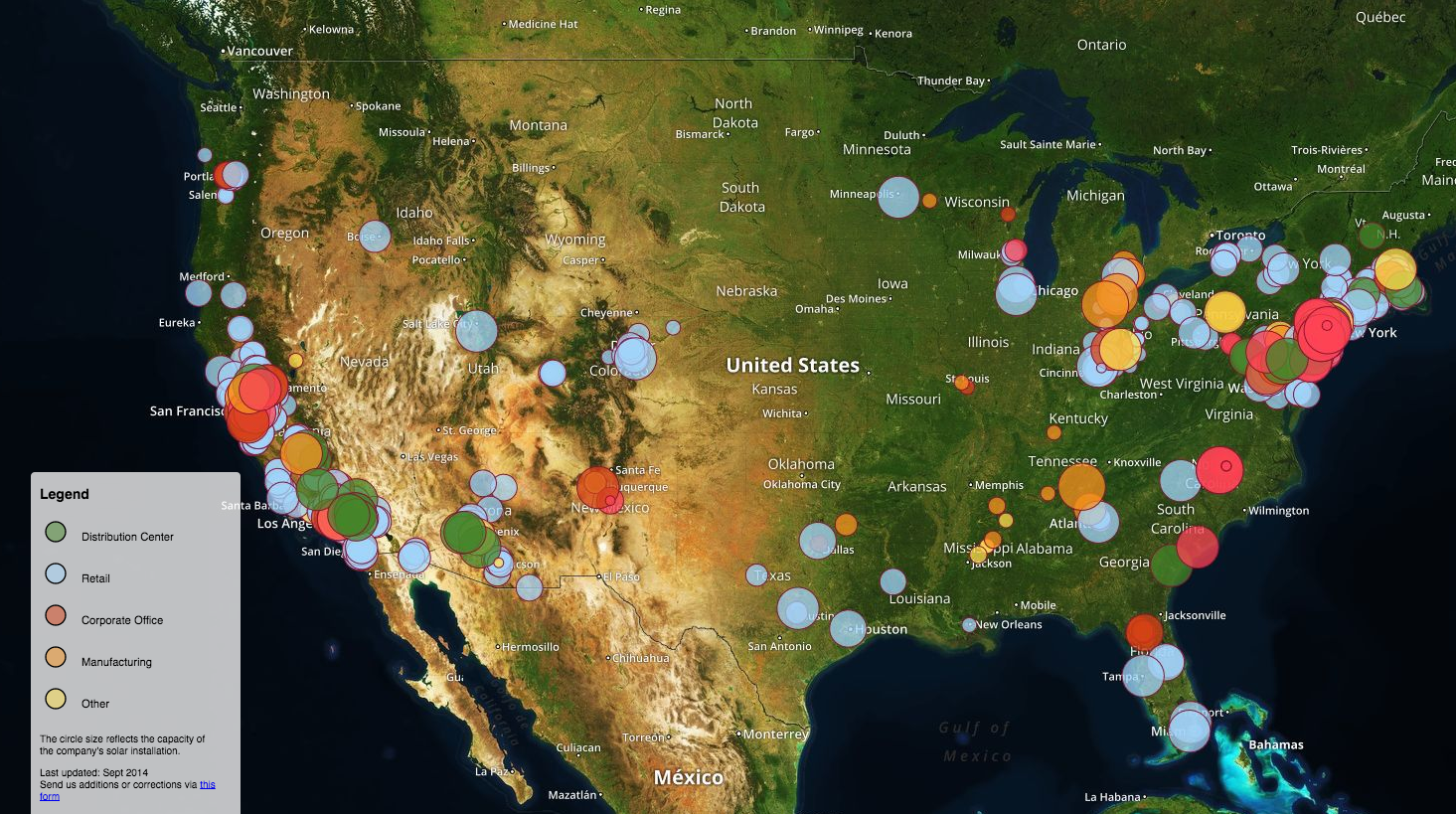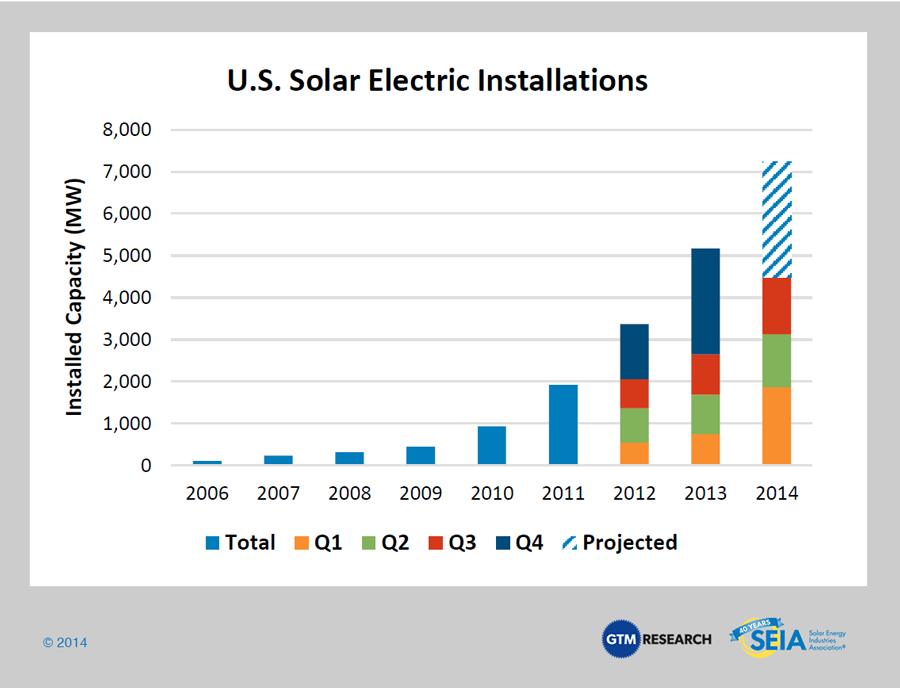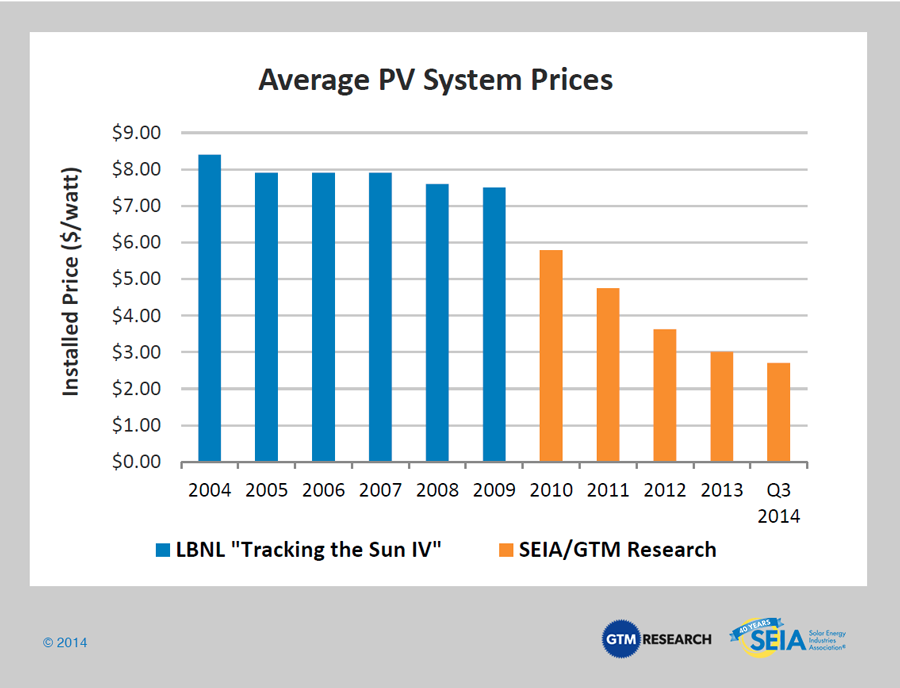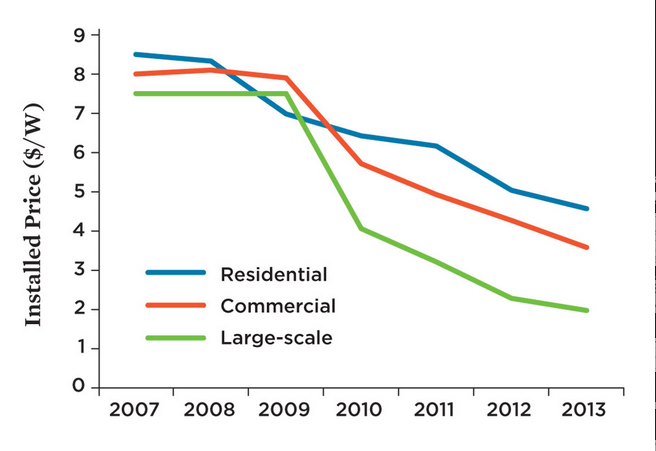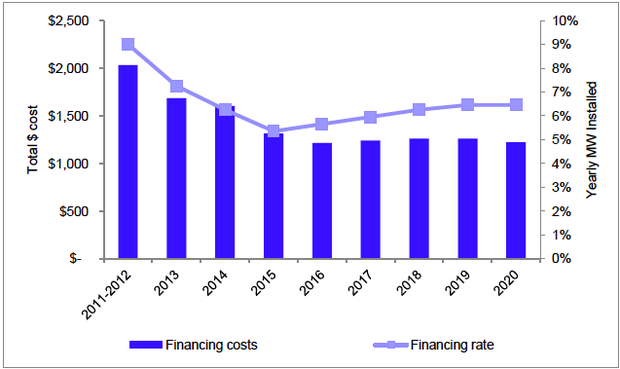#1 How regulators & legislators make it harder to use solar
Posted: Wed Feb 25, 2015 6:14 pm
It's not really surprising that utility companies would seek to have the rules rebalanced, so that customers of theirs who choose to use solar effectively donate free power to the utility companies, and pay the utility companies for the privilege.computerworld.com wrote:When homeowners or businesses install solar panels, state laws ensure utility companies pay for unused electricity that is routed back into the power grid - a practice known as net metering.
Currently, 43 states and the District of Columbia have implemented net metering policies, some of which are more favorable than others, but all of which turn the power grid into a two-way street.
The cost of rooftop solar-powered electricity will be on par with prices for common fossil-fuel power generation in just two years, and the technology to produce it will only get cheaper, according to Deutsche Bank's leading solar industry analyst, Vishal Shah.
As Americans have warmed to solar power and its ability to reduce electricity bills, utilities are suffering revenue losses and have been seeking ways to recoup that money. Over the past several years, state utility commissions and legislatures have pursued policies that reduce the benefits of adopting distributed solar power systems for homeonwers and businesses.
Utilities are leading efforts to reduce net metering benefits
For example, Hawaiian Electric Co. Inc. this year asked the state's Public Utilities Commission to abolish its net metering policy because customers with photovoltaic panels aren't paying their fair share of maintenance costs.
Indiana legislators are pushing bills to make it more costly for consumers there to go with solar by reducing tax credits awarded for it. Legislation, such as HB1320, introduced by Indiana state Rep. Eric Koch, a Republican, would compel fixed charges on customer bills and reduce tax credits. The bill comes as the solar industry is fighting to get on its feet in the Hoosier state.
Koch, has said the bill's purpose is "to promote and grow net metering." Democratic state Rep. Matt Pierce said the bill "would effectively end net metering" by eliminating the incentive to deploy solar power.
Other states, such as Arizona, California, Hawaii, Idaho, Ohio, New Mexico, Louisiana, and Wisconsin, are discussing or have passed revisions to their net metering policies that would included fixed monthly surcharges for residences and businesses that install solar to make it less competitive with conventional forms energy.
For example, the Arizona Corporation Commission (ACC) -- the state's public utilities authority -- voted to charge $0.70 per kilowatt (KW) to rooftop solar owners to help offset utility revenue losses. The fee works out to about $7 a month for a typical 10KW residential system.
Last year, the Kansas House Energy Committee passed an anti-net metering bill (HB 2458) that was pushed by two major utilities -- Westar Energy and Kansas City Power & Light.
If made into law, the Kansas legislation would allow utilities to pay solar customers using net metering less than the retail rate of electricity. In turn, utilities could use the excess electricity that customers were turning back to them and sell it at the retail rate.
The Union of Concerned Scientists (UCS), a nonprofit science advocacy organization, believes pressure on legislators to reduce the benefits consumers reap from renewable energy are being led by a small number of industry-supported lobbying groups.
The results of lobbying efforts have been a mixed bag. In certain states, fossil fuel and utility lobbyists have had little effect, but in states such as Kansas, there have been efforts to roll back renewable energy standards for the past two years.
"In Kansas, it was very much the Koch Brothers group Americans for Prosperity that was driving the charge in the state legislature," said Dave Anderson, a spokesman for the UCS.
Americans for Prosperity (AFP), a conservative lobbying group started by David Koch and Richard Fink (a member of the board of directors of Koch Industries), produces policy papers each year and delivers them to congressional offices.
Americans for Prosperity did not return a request for comment by Computerworld.
Other fossil-fuel lobbying groups who've been behind efforts to eliminate or reduce incentives for deploying distributed solar power say current policies are not fair.
John Eick, the director of the Task Force on Energy at the American Legislative Exchange Council (ALEC), pointed out that utilities build and maintain the electrical grid over which all power is transferred, so utility customers who benefit from net metering should be charged a fee to help pay grid upkeep.
Why should consumers get a free ride?
"They're essentially using services for which they don't pay," Eick said.
ALEC, a nonprofit organization made up of conservative state legislators and private sector representatives, drafts model legislation that states can then use to create laws. The group, which receives funding from the Koch Brothers, sponsored at least 77 energy bills in 34 states last year that opposed renewable energy standards while pushing oil projects, such as the Keystone XL pipeline, according to the Centre for Media and Democracy (CMD).
CMD is a nonprofit, liberal watchdog group based in Wisconsin. Last year, CMD said it uncovered an ALEC spreadsheet tracking 131 state bills that would eliminate state renewable energy standards, bump up charges to U.S. households with solar, promote the Keystone XL pipeline, push back on proposed EPA coal regulations, and create industry-friendly fracking rules.
"ALEC's colorful spreadsheet provides insight into the lobbying agenda it pushed in the 2014 legislative sessions in states across the country," CMD stated.
Not necessarily a conservative or liberal agenda
While some might split the struggle involving renewable energy down conservative or liberal ideological lines, Rogers said that's not really the case.
For example, the Green Tea Coalition is a conservative movement based in Georgia whose stated goal is to promote environmentalism and seek common ground across the political spectrum to empower consumers with choice.
In 2013, Debbie Dooley, a founder of the first nationwide Tea Party protest, teamed up with the Sierra Club to form the Green Tea Party. The group then lead an effort against Georgia Power, which was trying to impose fees on customers who used rooftop solar power.
"So you've got this unusual alliance of people who get what the promise of the technology holds from an environmental perspective and consumer perspective, but they also recognize consumer rights and are pushing back on the monopolistic tendencies of utilities," Rogers said.
The Green Tea Coalition is now also leading efforts to promote consumer power choice in Florida and Wisconsin.
Brendan Fischer, general counsel for CMD, said most efforts to limit incentives for solar power adoption can be traced back to specific lobbying groups, such as ALEC.
The lobbying efforts are all aimed at protecting coal and oil industry bottom lines and protecting their business model, he said. "And, the increasing use of renewables is a threat to their business model," Fischer said.
Eick, however, said ALEC doesn't "push" its models for legislation on any legislators.
"If a state chooses use it as a model, that's its legislature's decision," Eick said.
Eick also compared net metering policies to forcing grocery stores to purchase surplus vegetables from home gardeners, except instead of tomatoes, "we're dealing with electricity generated from small-scale, onsite distributed generation sources."
John Rogers, a UCS senior energy analyst, called ALEC "a corporate bill mill or dating service for corporations and legislators," and pointed to its backing of anti-renewable energy bills, such as California Senate Bill 412, as evidence of its agenda.
ALEC's bills can be credited as models for proposed legislation in at least 15 states, Rogers said.
According to documents obtained by the Guardian newspaper, ALEC's 2013 resolution in support of the Keystone XL Pipeline was used as the model for pro-oil pipeline legislation in at least seven states.
"In Colorado, there have been 14 bills to roll back solar initiatives and two have been enacted. That's a pretty low success rate, but those efforts continue in color," Rogers said.
Solar capacity is still tiny
Currently, there is about 17,500 megawatts of solar electric capacity operating in the U.S., enough to power more than 3.5 million average American homes.
Still, solar capacity represents less than 1% of all electrical capacity in the U.S. The nation gets 39% of its power from coal, 27% from natural gas and 19% from nuclear power, according to Philip Jordan, vice president of the Solar Foundation.
However, 36% of all new electrical capacity deployed in the U.S. last year came in the form of solar power, according to the Solar Industry Energy Association.
"Solar could break 1% this year," UCS's Anderson said.
In addition, there are literally tens of thousands of coal-powered electricity plants targeted for closure over the next several years, Anderson said. "And tens of thousands of more are vulnerable ... and they're very unlikely to be able to compete with new natural gas or wind facilities," he said.
Those coal-fired generator closings are warranted because many the plants are rarely used and have outlived their 30-year lifespan. They also generate the worst of the harmful pollutants and greenhouse gases, according to a 2012 UCS report titled, "Ripe for Retirement: The Case for Closing America's Costliest Coal Plants."
According to the U.S. Energy Information Administration (EIA), U.S. coal-fired power plants have also been under significant economic pressure in recent years because of low natural gas prices and slow electricity demand growth.
The EIA's Annual Energy Outlook projects that a total of 60 gigawatts (GW) of capacity will be retired by 2020. That electrical capacity will need to be filled by other resources, including solar power.
"Clearly the move toward renewable energy makes economic and environmental sense," Fischer said. "But clearly utilities have a lot of money and influence, and they're going to continue to fight these battles."
It's not too surprising, but it's still disgusting.
